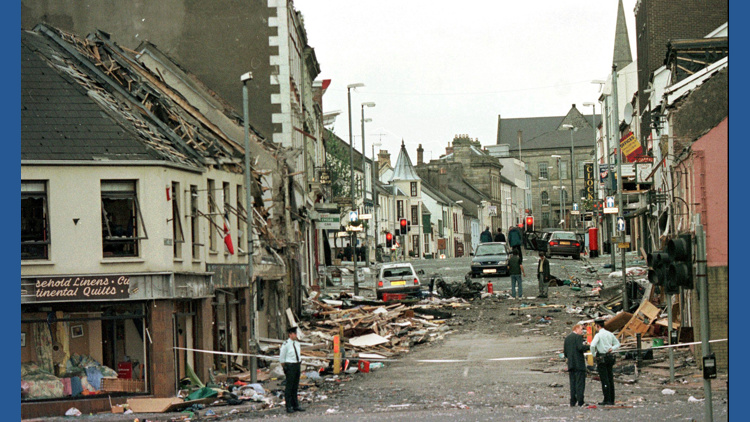
FILE - Royal Ulster Constabulary Police officers stand on Market Street, the scene of a car bombing in the centre of Omagh, Co Tyrone, 72 miles west of Belfast, Northern Ireland, on Aug. 15, 1998. (AP Photo/Paul McErlane, File)
As the fragile ceasefire in Gaza unfolds, lessons from the Northern Ireland peace process of the 1990s could provide valuable insights for navigating this complex situation. Former British Prime Minister Tony Blair and his chief of staff, Jonathan Powell, are once again in the international spotlight, having engaged in discussions with the United States and other nations about establishing a sustainable peace in Gaza.
This week, UK Prime Minister Keir Starmer emphasized the importance of utilizing the UK’s historical experience, stating, “Drawing on our experience in Northern Ireland, we stand ready to play a key role in the decommissioning of Hamas’ weapons and capability.” The backdrop to these discussions is dire: approximately 3,600 people lost their lives and around 50,000 were wounded during the three decades of conflict known as “the Troubles” in Northern Ireland, which primarily involved Irish republican militants seeking to detach the region from the United Kingdom.
In 1998, a peace accord was reached that largely concluded the violence and led to the disarmament of the Irish Republican Army (IRA) and other militant factions. The current situation in Gaza is markedly different yet presents parallels. The ongoing conflict, ignited by a devastating attack from Hamas on October 7, 2023, left around 1,200 people dead and 251 hostages taken. Israel’s subsequent military response has resulted in significant destruction across Gaza, with nearly 68,000 Palestinian casualties reported, according to the territory’s Health Ministry.
Kristian Brown, a politics lecturer at Ulster University in Belfast, noted, “The level of challenge in the Middle East now is monumental.” He emphasized that the bitterness and immediate threats faced today in Gaza are far more severe than those experienced during the Northern Ireland conflict. The IRA’s reluctance to surrender its weapons was a major obstacle in their peace talks. Similarly, the current framework for Gaza, which demands that Hamas disarm, faces skepticism, as the group has expressed unwillingness to fully relinquish its arms.
While the plan endorsed by former U.S. President Donald Trump aims to address disarmament, it does not outline a clear path to Palestinian statehood, a condition seen internationally as essential for resolving the long-standing Israeli-Palestinian conflict. The absence of a detailed strategy for addressing critical issues such as the status of Jerusalem, the return of Palestinian refugees, and security arrangements is concerning.
The IRA eventually agreed to disarm through a secretive process overseen by an international commission, with disarmament efforts running parallel to the resolution of political disputes. This approach contrasts sharply with over three decades of U.S.-led initiatives in the Middle East, which have yet to yield similar results. The first decommissioned weapons from the IRA appeared in 2001, with the final dismantling occurring in 2005, seven years after the Good Friday Agreement was signed.
Niall Ó Dochartaigh, a professor at the University of Galway, highlighted the importance of patience and pragmatism in the peace process. He pointed out that the IRA leadership required support to advocate for disarmament within their ranks. “Ultimately, decommissioning only happened in the Irish case once the IRA was satisfied that there was a political settlement bedded down,” he explained.
Despite the emergence of a potential compromise in Northern Ireland, a similar consensus in the Middle East appears distant. The 20-point plan for Gaza proposes a broad vision, encompassing ceasefire and peacemaking, yet leaves unanswered questions about implementation. The Good Friday Agreement was more comprehensive, detailing the structures necessary to support peace, including a legislature and government established through two years of U.S.-backed negotiations.
Despite the progress made in Northern Ireland, challenges remain. The power-sharing political system has faced multiple collapses, and incidents of violence continue. Four months post-agreement, IRA dissidents executed a car bomb attack in Omagh, resulting in 29 fatalities, the deadliest single incident of the conflict.
Engaging all stakeholders, including those with violent histories, was crucial to Northern Ireland’s success, according to Peter McLoughlin, a senior lecturer in politics and history at Queen’s University Belfast. He emphasized the importance of including Hamas in future political discourse in Gaza. “If there was a broad lesson from the success of Northern Ireland, it’s that an inclusive process worked,” he stated.
Starmer’s comments about the UK’s role in monitoring ceasefires highlight the relevance of Blair and Powell’s experiences. Blair, who served as UK Prime Minister from 1997 to 2007, has been recognized for his long-standing engagement in Middle Eastern affairs, including his role as an envoy for the “Quartet” of the U.S., European Union, Russia, and the United Nations until 2015.
Despite his controversial legacy, particularly regarding the Iraq War in 2003, he remains a notable figure in peace discussions. Trump acknowledged that Blair might not be universally accepted in the region, indicating the complex dynamics at play.
While Powell now serves as Starmer’s national security adviser and participated in a recent summit in Egypt, there are differing views on the UK’s prospective influence in Gaza. Bronwen Maddox, director of Chatham House, expressed skepticism about drawing direct parallels between the two peace processes. She noted that while the Northern Ireland agreement was significant, the complexities of the Gaza situation are unique.
As the international community looks to the past for guidance, the path forward remains challenging. The lessons learned from Northern Ireland may offer insights, but the distinct realities in Gaza necessitate a tailored approach to achieve lasting peace.







